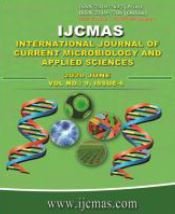


 National Academy of Agricultural Sciences (NAAS)
National Academy of Agricultural Sciences (NAAS)

|
PRINT ISSN : 2319-7692
Online ISSN : 2319-7706 Issues : 12 per year Publisher : Excellent Publishers Email : editorijcmas@gmail.com / submit@ijcmas.com Editor-in-chief: Dr.M.Prakash Index Copernicus ICV 2018: 95.39 NAAS RATING 2020: 5.38 |
The experiment on Effect of microbial consortia as basal application and foliar spray of G. diazotropicus on maize (Zea maize) was carried out during Kharif 2018 in the experimental field under Department of Soil Science & Agricultural Chemistry. The experiment was laid out under randomized block design (RBD) with 3 replications having 18 treatments of microbial consortia of Arthrobacter sp., phosphate solubilizing bacteria (Bacillus sp.) and potash solubilizing bacteria (Fraturia aurentia) as seed treatment and additionally, Gluconacetobacter diazotrophicus was applied as foliar application at 25, 45 and 65 DAS of the crop growth stages. The crop was supplemented with recommended dose of fertilizers 120:60:40 (N:P2O5:K2O kg/ha) at basal application. Besides these, two types of control plots were maintined as fertilized uninoculated control (FUI) and unfertilized uninoculated control (UFUI Regarding findings towards study of growth, yield and nutrient uptake by maize, the treatment combinations of F+G. diazotropicus+Arthro+PSB+KSB increased plant height by 75.5, 42.8 and 26.7%, plant biomass (fresh and dry) by 87.3, 26.3 and 36.6%, and 8.72, 41.9 and 28.1%, respectively and leaf chlorophyll content by 49.6, 48.5 and 16.6% at 35, 55 and 75 DAS. The same treat combination yielded maximum grain and stover at harvest by 33.4 and 77.9%, respectively over the control (2146 and 6029 kg ha-1) with major nutrient contents by 17.5, 14.7 and 18.9% more in N, P and K, respectively. These were all the positive influence of G. diazotropicus and Arthrobacter when crop was supplemented with sufficient available nutrient particularly phosphorus with PSB, as the soil was moderately deficient of phosphorus. However, response of KSB was not evident since the soil was sufficient with potash.
 |
 |
 |
 |
 |